WHY DOESN’T TIM Eyman just get it over with and propose an initiative that abolishes all our taxes?
That is, beyond any shadow of a doubt, the logical extension of Eyman’s unending string of initiatives—a string, Eyman announced last week, that will next include one to be labeled Initiative 800. It’s perfect numbering for an electorate that seems to think government services shouldn’t cost anybody anything.
Eyman, of course, doesn’t see it that way. He claims to represent the mythic taxpayer, ignored by Politicians and the Liberal Media and stretched beyond breaking by a bewildering, burdensome Big Brother. And Eyman does represent at least a solid majority of Washington’s voting taxpayers: They’ve passed every single one of his anti-tax measures comfortably in recent years.
That included, earlier this month, Initiative 776, which, among other things, gave Sound Transit a giant sucking wound where its mismanaged budget used to be. Eyman haters persisted during this past campaign in focusing on the personality of Eyman (and, this year, his ethical lapses), and Tim rubbed their faces in it at every opportunity. It’s great political theater, but it obscures the larger question of our future as a state.
Eyman’s face rubbing, it appears, has reached new heights. I-800, slated for a fall 2003 vote, proposes a 75 percent “supermajority” requirement for any tax or fee increase of any type by any state, county, or local legislative body. There is no exception for inflation nor for emergency spending measures such as, oh, say, a 9/11-style terrorist attack.
EYMAN HAS LEARNED to leave caveats that make his initiatives sound reasonable. If the need is pressing enough, he’ll argue, lawmakers will unanimously approve an increase. Or voters will vote for higher property taxes.
It sounds fine, except that as Tim knows, it’s not how the real world works. When was the last time the Legislature came to quick agreement on even majority passage of a budget of any kind— let alone one with a tax increase or with three-fourths approval, which is more than needed to override a veto or amend the state constitution.
Because of inflation alone, this is a death sentence for government. How many programs could we fund at today’s prices with a budget in 1972 dollars? That’s what I-800 would do in 30 years to the budgets of every single government entity in our state—even before considering Eyman’s past measures.
For months to come, our city and county councils and state Legislature will work overtime to agree on budgets that involve painful cuts—to fire and police and especially recession-burdened social services. Eyman’s past handiwork is in each of those debates.
But why blame Eyman? Voters did it, and voters will keep doing it. For a generation, politicians of both parties have run against politics, as “outsiders,” and in so doing have reinforced the belief in all of us that government is a bad thing. We go to the ballot booth and elect politicians who promise to be different, and then ask them to fund a long list of goodies we’d like to have. Where the hell do they—we—think the money comes from to pay for it all?
IT COMES FROM US, of course, but most people don’t think of taxes as something we willingly pay to get better roads, decent schools, police protection, fire safety, industrial infrastructure and business promotion, programs to help the least fortunate and (usually) help the most fortunate even more, and to protect the environment from and for us all. The steps between our checkbooks and the asphalt crew or precinct station are too many and too indirect.
Thus, pols have learned never, ever to advocate for more money for those programs. Raising taxes is something almost no prominent, re-election-minded official from either party even thinks of doing; instead, minimal increases are deceptively hidden (which people resent even more). And since more campaign money comes from the wealthy, our taxes become increasingly regressive—fueling the resentment of average-income voters that much more.
In such a culture, reforming an unfair tax structure is politically impossible, and hell will freeze over, melt, and freeze over again before 75 percent of a legislative body votes for higher taxes.
So why torture us? Why, for that matter, pay lawmakers and department staffs so much overtime to cauterize the sucking wounds? Why not just get it over with, Tim, and propose that we abolish our taxes entirely? The logic is consistent: They’re taxes. We don’t like them. We can spend the money better ourselves. It’s just giving voters a choice.
Best of all, the last person leaving our state won’t even need to turn the lights off. The utilities will have already gone out of business.
By then, even the toll-free numbers probably won’t work.
gparrish@seattleweekly.com 







